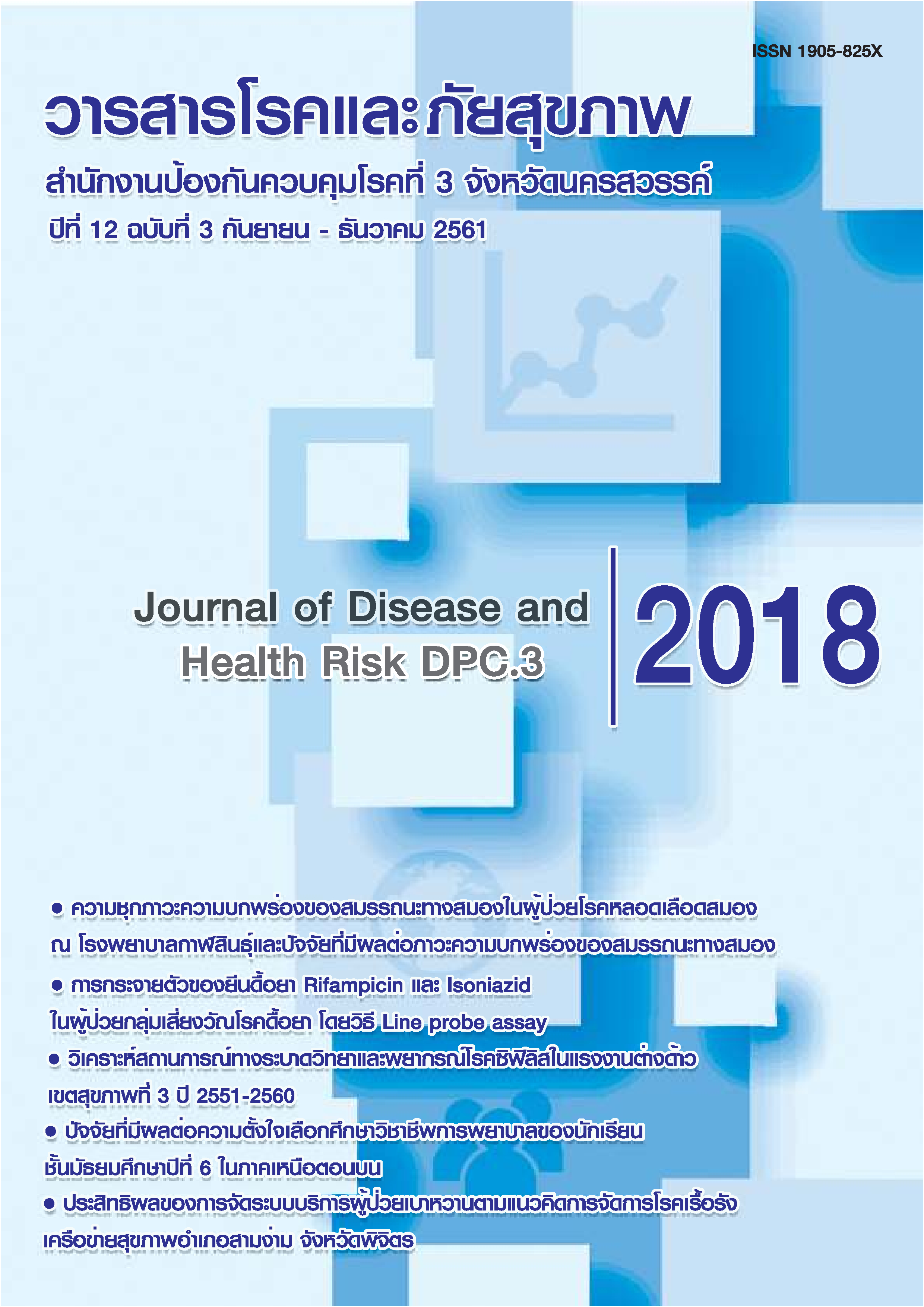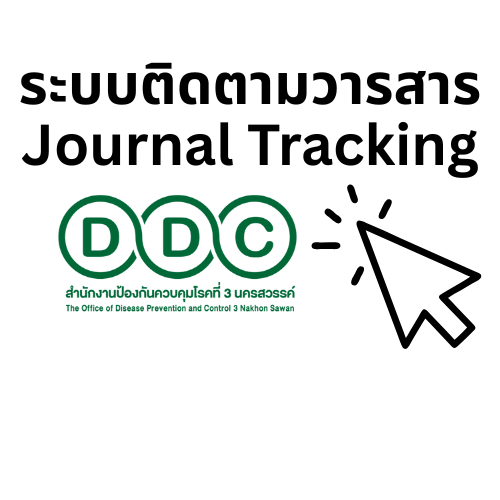The Prevalence of Cognitive Impairment in Post-stroke Patients in Kalasin Hospital and Associated Factors for Cognitive Impairment in Post-stroke Patients
Keywords:
Strok, Poststroke dementia, Cognitive impairmentAbstract
Poststroke dementia is a dementia which is common occurred after stroke. The aim of this research was to study prevalence of cognitive impairment in stroke patients and to determine the associated factors. This Hospital based cross-sectional studied 214 participants were assessed within the May to August 2018 on Thai Metal State Examination. Logistic Regression Analysis was used to identify associated factors, shown the result as adjusted odd ratio and 95% confidence interval. The results indicated that participants are men 51.87% and women 48.13%. Mean TMSE score was24.7 (SD = 2.48) and the prevalence of cognitive impairment was 10.28%. The factors that associated with cognitive impairment were patients who had age ≥ 60 years old (AOR = 9.64 95% CI: 0.04 – 0.17), left hemispheric lesion of brain (AOR = 0.23 95% CI: 0.15 – 1.01), bilateral hemispheric lesion of brain (AOR = 2.97 95% CI: 1.00 – 4.74) and history of recurrent stroke
(AOR = 15.00 95% CI: 0.89 – 9.39). These findings showed cognitive impairment was common detected in post-stroke patients. Consequently evaluation of cognitive impairment in post-stroke patients is necessary to rehabilitation efficiency. Prevention of recurrent stroke is important to reduce risk
References
2. Censori B, Manara O, Agostinis C, Camerlingo M, Casto L, Galavotti B et al. Dementia after first stroke. Stroke 1996; 27(7): 1205-10.
3. Kokmen E, Whisnant JP, O’Fallon WM, Chu CP, Beard CM. Dementia after ischemic stroke: a population-based study in Rochester, Minnesota (1960-1984). Neurology 1996; 46(1): 154-9.
4. เจษฎา เขียนดวงจันทร์. โรคสมองเสื่อมตามหลังโรคหลอดเลือดสมอง. วารสารสมาคมโรคหลอดเลือดสมองไทย 2558; 14(3): 146-52.
5. Mysiw WJ, Beegan JG, Gatens PF. Prospetive cognitive assessment of stroke patients before inpatient rehabilitation. Am J Phys Med Rehabil 1989; 68(4): 168-71.
6. Folstein MF, Folstein SE, McHugh PR. “Mini Mental State.” A practical method for grading the cognitive state of patients for the clinician. J Psychiat Res 1975; 12: 189-98.
7. Godefrog O, Fickl A, Roussel M, Auribault C, Bugnicourt JM, Lamy C et al. Is the Montral Cognitive Assessment superior to the Mini-Meal State Examination to detect poststroke cogntive impairment? A study with neuropsychological evaluation. Stroke 2011; 42(11): 1712-6.
8. อัญชุลี เตมียประดิษฐ์, วรัญ ตันชัยสวัสดิ์, ชุมศรี หังสพฤษ์, อ้อมทิพย์ พันธ์ศิริ. Mini-mental state examination (MMSE): แบบทดสอบในการตรวจหาภาวะความพิการทางสมอง. วารสารสมาคมจิตแพทย์แห่งประเทศไทย 2533; 35: 208-16.
9. กลุ่มฟื้นฟูสมรรถภาพสมอง. แบบทดสอบสมรรถภาพสมองของไทย. สารศิริราช 2536; 45(6): 359-74.
10. Poungvarin N, Prayoonwiwat N, Devahastin V, Viriyavejakul A. Dementia in Thai stroke survivors: analysis of 212 patients. J Med Assoc Thai 1995;78:337-43.
11. Wangtongkum S, Sucharitkul P, Silprasert N, Inthrachak R. Prevalence of dementia among population age over 45 years in Chiang Mai, Thailand. J Med Assoc Thai 2008; 91(11): 1685-90.
12. สถาบันประสาทวิทยา. แนวทางเวชปฏิบัติภาวะสมองเสื่อม. กรุงเทพ: บริษัทธนาเพรส จ?ำกัด; 2557.
13. Surawan J, Areemit S, Tiamkao S, Sirithanawuthichai T, Saensak S. Risk factors associated with post-stroke dementia: a systematic review and meta-analysis. Neurol Int 2017; 9(3): 63-8.
14. Gwo-Chi Hu, Yi-Min Chen. Post-stroke dementia: epidemiology, mechanism and management. Int J of Gerontology 2017; 11(4): 210-4.
15. อลิสรา เตชะไพฑูรย์, วิษณุ กันทรทิพย์, อรฉัตร โตษยานน์. สมรรถภาพสมองของผู้ป่วยอัมพาตจากโรคหลอดเลือดสมอง. เวชศาสตร์ฟื้นฟูสาร 2543; 9(3): 120-3.
16. นันทกา ภักดีหงส์, เจียมจิต แสงสุวรรณ. ภาวะพร่องของสมรรถภาพสมองในผู้สูงอายุโรคหลอดเลือดสมองเฉียบพลัน. วารสารสมาคมประสาทวิทยาศาสตร์ภาคตะวันออกเฉียงเหนือ 2555; 7(1): 66-79.
17. Saxena SK. Prevalence and Correlates of Cognitive Impairment in Stroke Patients in a Rehabilitation Setting. Inter J Psy Rehabil 2006; 10(2): 37-47.
18. Patel MD, Coshall C, Rudd AG, Woife CD. Cognitive impairment after stroke: clinical determinants and its associations with long-term stroke outcomes. J Am Geriatr Soc. 2002; 50(4): 700-6.
19. Toole J, Bhadelia R, Williamson J, Veltkamp R. Progressive cognitive impairment after stroke. J Stroke Cerebrovasc Dis 2004; 13(3): 99-103.
20. Pendlebury ST, Rothwell PM. Prevalance, incidence and factors associated with pre-stroke and post-stroke dementia: a systematic review and meta-analysis. Lancet Neurol 2009; 8(11): 1006-18.
21. สายสุนีย์ เลิศกระโทก, สุธรรม นันทมงคลชัย, ศุถชัย ปิติกุลตัง. ความชุกของภาวะสมองเสื่อมและปัจจัยที่ความสัมพันธ์กับภาวะสมองเสื่อมในผู้สูงอายุ ต?ำบลอรพิมพ์ อ?ำเภอครบุรี จังหวัดนครราชสีมา. วารสารสาธารณสุขศาสตร์ 2556; 43(1): 42-54.
Downloads
Published
How to Cite
Issue
Section
License
Copyright notice
Article published in the Journal of Disease and Health Risk DPC.3 Nakhon Sawan. It is considered a work of academic research and analysis as well as the personal opinion of the author. It is not the opinion of the Office of Disease Prevention and Control 3, Nakhon Sawan. Or the editorial team in any way Authors are responsible for their articles.
Privacy Policy
Name, address and e-mail address specified in the Journal of Disease and Health Risk DPC.3 Nakhon Sawan. It is used for identification purposes of the journal. And will not be used for any other purpose. Or to another person.









